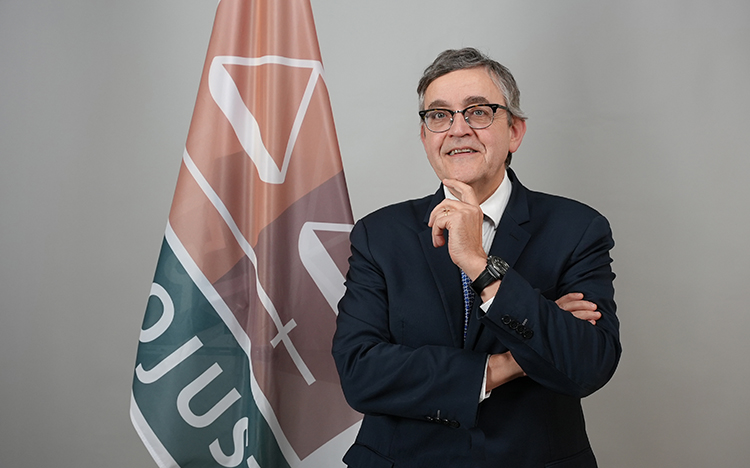
National Member
Baudoin Thouvenot was appointed National Member for France in September 2019. Mr Thouvenot is a career investigative judge. He was 12 years old when he made up his mind about his future professional path and never changed it since then. His first appointment as an investigative judge was with the Court of Dunkirk in 1991, followed by several posts in the jurisdictions of the Court of Paris, where his last appointment was as Dean of the investigative judges of the Court of Paris. During his 15-year tenure as an investigative judge for the Court of Paris, Mr Thouvenot spent 10 years as a judge for the JIRS of Paris (interregional specialised jurisdiction, dealing with organised crime), and started visiting Eurojust at its previous headquarters in Voorburg, the Netherlands. Mr Thouvenot took part in a coordination meeting at Eurojust for the first time in 2003, and came back on several times. He became a convinced ‘client’ of Eurojust over the years, frequently satisfied with what could be achieved in a case after a one-day coordination meeting. For him, ‘Eurojust is a practical and efficient means for judicial cooperation’.
In 2006, he took part in a triptych documentary film project on ‘Judicial Europe’ and suggested using a case he was working on, which involved the trafficking in human beings for sexual purposes, as an example of judicial cooperation in action. Mr Thouvenot was one of the magistrates filmed during the different phases of the case involving five Member States. This first part, ‘Escort’, was released in 2010, and the second part of the documentary project, ‘Marriages for sale’, in 2014. This project’s third film will be released in 2020. The filmmaker, Olivier Ballande, lauded Mr Thouvenot’s involvement, saying that ‘without him, we couldn’t have made these films’.
Mr Thouvenot sees his mandate as French National Member at Eurojust as a logical completion of his career. He is eager to enrich himself with the knowledge of the different judicial systems and firmly believes that when it comes to judicial cooperation there are no ‘small countries’, but rather magistrates fighting crime across borders. He is looking forward to working closely with all his colleagues and promoting a strong European spirit in the College.
Deputy National Member
Nicolas Le Bris graduated from the National School of Magistrates in 2008 and has been a public prosecutor since then. Until 2011, he was appointed to different courts in the jurisdiction of the Court of Appeal of Rennes, before moving to the Court of Paris, still as a public prosecutor.
In 2014, Mr Le Bris joined the Counter Terrorism Unit of the Public Prosecutor’s Office in Paris. In this capacity, he was the prosecutor on call in the night of 13 November 2015, as the Paris terror attacks were unfolding. He has been building the case against the terrorists and prosecuted the perpetrators during the trial that lasted from 8 September 2021 until the verdict was issued on 29 June 2022.
In the context of the Paris terror attacks, Mr Le Bris discovered Eurojust by participating in several coordination meetings and a joint investigation team, where he could witness how the involvement of the Agency lead to tangible progress in crucial issues in the case. He says about Eurojust that its main strength is ‘to gather people around the table who otherwise wouldn’t communicate directly’.
Assistants to the National Member
Sophie Gschwind is Assistant to the National Member since September 2024.
Jonathan Roz is Assistant to the National Member.
Morgan Martin is Assistant to the National Member.
Interview with National Member Baudoin Thouvenot
What strikes you most about working at Eurojust?
I am impressed by the quality of cooperation among the different National Desk members on cases. We manage to work together, despite the differences in our cultural and legal systems, and find the best practical and judicial solutions to support our respective authorities.
Could you describe a case that you have supported and which had a particularly successful outcome?
For a major case of fraud, we organised an action day and coordination centre on 9 January 2020 at Eurojust, involving seven countries and two French jurisdictions. The ability between Eurojust colleagues to react quickly and efficiently to the needs of the authorities in the field was impressive. The outcome of the operation was particularly successful as the organised crime group’s actions and crime proceeds were evaluated to be worth several billion euros. On a more personal level, I found myself in a position, as a National Member, to issue an European Investigation Order, in agreement with the investigative judge in charge of the case (who was involved in one of the field operations), as it is in my power as stated in the French Penal Proceeding Code.
Which of the services and tools available through Eurojust do you consider most important for national judicial authorities – and why?
Coordination meetings and coordination centres (the latter being a French concept developed by Nicolas Chareyre, previous Deputy National Member of the French Desk) allow us to sit at the table and discuss how to cooperate in a case and always find the best solution, or at least a solution that is suitable for all parties, in a timely manner but also in cases of emergency. The service of the interpreters that Eurojust offers during the coordination meetings is absolutely crucial for the discussion process to succeed. I also believe that the excellent relationships the Desk members are able to build by being together in the Eurojust building, in a respectful and kind atmosphere, is an invaluable asset in the support Eurojust provides to national authorities.







